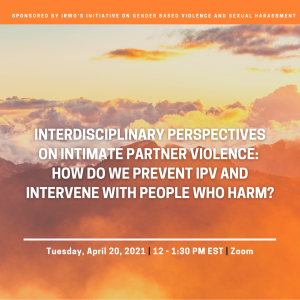Interdisciplinary perspectives on intimate partner violence: How do we prevent IPV and intervene with people who harm?

- Maxine Davis, PhD, Assistant Professor,School of Social Work, The University of Texas at Arlington
- Lisa Y. Larance, MSW, LCSW, LMSW, PhD Student, Social Work/Sociology Candidate, U-M
- Jim McEvilly, LMSW, Founder & Therapist, McEvilly Counseling
- Quyen Ngo, PhD, LP, Executive Director, Butler Center for Research, Hazelden Betty Ford Foundation
- Vijay Singh, MD, MPH, MS, FAAFP, Clinical Assistant Professor, Family Medicine, Internal Medicine, and Emergency Medicine, U-M Medical School
- Richard M. Tolman, Sheldon D. Rose Collegiate Professor of Social Work, U-M

This event will focus on inter-professional approaches for prevention and intervention efforts for people who harm. The panel consists of an interdisciplinary group who will highlight research, teaching or clinical practice in this area. The panel brings together perspectives from social work, psychology, sociology, and medicine. Sponsored by IRWG’s Initiative on Gender Based Violence and Sexual Harassment.
Register here to receive the Zoom link. Note: you may register after the event has started.
About the panelists:

Dr. Maxine Davis is currently an Assistant Professor in the School of Social Work at the University of Texas at Arlington. She is a scholar of intimate partner violence (IPV), with a particular focus on perpetration and interventions to assist Black and Latino men in ending abusive behaviors in their romantic relationships. Dr. Davis completed her PhD in Social Work from the George Warren Brown School of Social Work at Washington University in St. Louis in 2018. She studies people who act abusively within romantic intimate relationships and interventions that are designed to help them change. With specific attention on Black-American and Latinx (pronounced: Lat-een-X) populations, her research is guided by former work in Partner Abuse Intervention Programs mostly attended by men who were arrested and convicted of domestic violence. Her most recent work explores how to reach people who have acted abusively and help them change their behavior outside of the criminal justice/carceral system. As an investigator who also examines the intersection of religious-faith and intimate partner violence (IPV), a related track of her research examines how religion (within a Christian context) is misused to perpetrate IPV. Most of her research uses a community-engaged approach, centering the voices of historically excluded racial groups as equal partners. Given the racial health disparities in IPV, she also provides expert commentary on racial justice issues for Black and Latino families in documentaries and other media outlets. Her independent and collaborative work on the experiences of racially minoritized populations has been published in several academic journals, including the Journal of Black Sexuality & Relationships; Trauma, Violence, & Abuse; the American Journal of Men's Health; and Nature (Human Behavior). Her research has been funded by several research centers including a national organization in Washington, D.C.; and most recently Dr. Davis was named as a recipient of the Louisville Institute 2021 Project Grant for Researchers. The driving force behind her passion is fueled by a spirit of hope that with proper support and resources, people who have acted abusively can become committed to peaceful living.

Lisa Young Larance, MSW, LCSW, LMSW, is a practitioner-scholar whose practice and research focus on understanding and addressing the needs of marginalized women and their families. She created and implemented two innovative community-based programs in the United States providing intervention, advocacy, and support for women with domestic and sexual violence survivorship histories who used force in their relationships: Jersey Battered Women’s Service, Inc.’s Vista Program (New Jersey, U.S.A.) and Catholic Social Services of Washtenaw County's RENEW Program (Michigan, U.S.A.). She also co-developed and implemented the Meridians for Incarcerated Women program serving women in the Michigan Department of Corrections. Ms. Larance consults domestically and internationally for a range of organizations including the New Mexico Coalition Against Domestic Violence (U.S.A.), Harmony House’s Nurturing Hearts Violence Prevention Program (Hong Kong, China), Baptcare and Berry Street’s +SHIFT Program (Melbourne, Australia), and the United States Air Force’s Family Advocacy Program (Global). Her work has appeared in numerous publications including Affilia: Journal of Women & Social Work, BMJ Open, International Social Work, Journal of Interpersonal Violence, Psychology of Violence, and Violence Against Women. She is a doctoral candidate in Social Work and Sociology at the University of Michigan. Ms. Larance’s dissertation research explores the complex experiences of women who have had contact with antiviolence intervention.
 Jim McEvilly, LMSW is the founder and lead clinician for McEvilly Counseling, PLLC, which provides therapeutic services within the Washtenaw County area In addition to providing counseling and consulting services Jim also serves as an adjunct lecturer with the University of Michigan School of Social Work. Jim has worked within the gender-based violence movement for approximately twelve years and has partnered with several different anti-violence organizations across Michigan during that time. Most recently Jim served as a Case Manager with the Office of Student Conflict Resolution (OSCR) at the University of Michigan where he facilitated Title IX related processes and implemented the Science-based Treatment, Accountability and Risk Reduction for Sexual Assault (STARRSA) Active Psychoeducation (AP) Program. STARRSA sought to engage students found responsible of engaging in sexual misconduct or who wished to learn more about healthy relationships in developing behaviors and perspectives that supported their personal, interpersonal, and community wellbeing. Prior to working with OSCR Jim served as a Case Manager and Advocate with the Sexual Assault Prevention and Awareness Center (SAPAC) at the University of Michigan where he provided holistic supportive services (ex. Title IX advocacy, legal advocacy, housing support, financial assistance, stop-gap mental health services). Additionally, during his time at U-M, Jim co-founded the Michigan Men Program, which engaged masculine-identified individuals in structured programming focused on developing authentic, individualized, intersectional, and wellness-focused masculine identities.
Jim McEvilly, LMSW is the founder and lead clinician for McEvilly Counseling, PLLC, which provides therapeutic services within the Washtenaw County area In addition to providing counseling and consulting services Jim also serves as an adjunct lecturer with the University of Michigan School of Social Work. Jim has worked within the gender-based violence movement for approximately twelve years and has partnered with several different anti-violence organizations across Michigan during that time. Most recently Jim served as a Case Manager with the Office of Student Conflict Resolution (OSCR) at the University of Michigan where he facilitated Title IX related processes and implemented the Science-based Treatment, Accountability and Risk Reduction for Sexual Assault (STARRSA) Active Psychoeducation (AP) Program. STARRSA sought to engage students found responsible of engaging in sexual misconduct or who wished to learn more about healthy relationships in developing behaviors and perspectives that supported their personal, interpersonal, and community wellbeing. Prior to working with OSCR Jim served as a Case Manager and Advocate with the Sexual Assault Prevention and Awareness Center (SAPAC) at the University of Michigan where he provided holistic supportive services (ex. Title IX advocacy, legal advocacy, housing support, financial assistance, stop-gap mental health services). Additionally, during his time at U-M, Jim co-founded the Michigan Men Program, which engaged masculine-identified individuals in structured programming focused on developing authentic, individualized, intersectional, and wellness-focused masculine identities.

Dr. Quyen Ngo leads research activities at the Hazelden Betty Ford Foundation as the new executive director of the Butler Center for Research. Prior to that, she was a Clinical Psychologist at the University of Michigan Department of Emergency Medicine. Her research interests include intimate partner violence in families and the safety and well being of children exposed to violence in homes with access to firearms. Her work is trauma focused and trauma informed and uses contemplative practice-based approaches and technology as means of intervention delivery.

Vijay Singh, MD MPH MS FAAFP is a family medicine physician, hospitalist, and Clinical Assistant Professor in the Departments of Family Medicine, Internal Medicine, and Emergency Medicine at the University of Michigan (U-M) Medical School. He is Core Faculty in U-M Injury Prevention Center, Faculty Associate at U-M Global Reach, Faculty Affiliate at U-M Institute for Research on Women and Gender, and member of U-M Institute for Healthcare Policy and Innovation. He received an MD from Northwestern University, MPH from Johns Hopkins University, family medicine residency at UCLA, and MS from U-M, where he completed the RWJF Clinical Scholars Program. He works clinically at U-M and has taught intimate partner violence (IPV) identification and response in healthcare to over 2,500 medical students, resident physicians, and healthcare providers in continuing education. He has over 20 publications focusing on IPV identification and response, including for people who harm. His research has been funded by the World Health Organization, American Academy of Family Physicians Foundation, and Society of Teachers of Family Medicine Foundation.

Richard M. Tolman, LMSW, PhD, is the Sheldon D. Rose Collegiate Professor of Social Work at the University of Michigan. He received his doctorate in social welfare from the University of Wisconsin-Madison and his MSW from the University of Michigan. Professor Tolman's work focuses on the effectiveness of interventions designed to change violent and abusive behavior, and the impact of violence on the physical, psychological and economic well-being of survivors. He began his work in this area as a practitioner working with men who batter in 1980. His contributions include the development of a widely used measure of psychological maltreatment, development, and evaluation of interventions for IPV perpetrators, examining the accuracy of survivors’ predictions of future abuse, and adolescent intimate partner violence. His current projects include research on the impact of and prevention of abuse during pregnancy, supporting fathers in positive relationships with their children and partners, prevention of campus sexual assault, and involvement of men and boys as allies to end men's violence against women.
